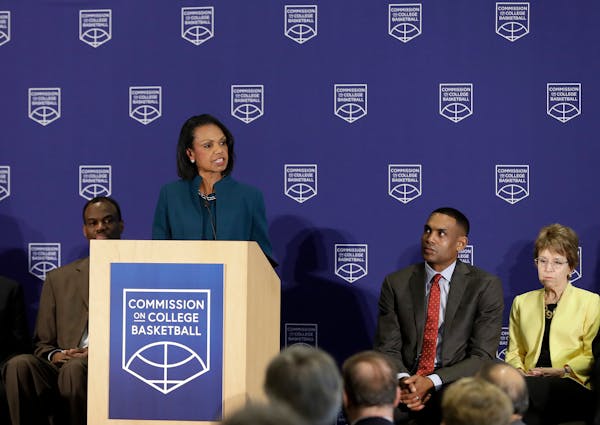NCAA leaders at this year's Final Four in San Antonio had no answers on how to fix the corruption facing men's college basketball. They were waiting on recommendations from the Commission on College Basketball, headed by former Secretary of State Condoleezza Rice.
Those recommendations for reform came in a 60-page report, released Wednesday morning at NCAA headquarters in Indianapolis, and the NCAA will discuss implementing some of those changes as soon as the 2018-19 season, University of Minnesota President Eric Kaler told the Star Tribune.
The NCAA Division I Board of Directors, of which Kaler is chairman, already has agreed to move forward in creating legislation. Various subgroups were given assignments to turn the commission's ideas into proposals to consider during the board's Aug. 8 meeting.
"With the goal of getting as many of the reforms as possible by the first tip-off of the basketball season of the fall of 2018," Kaler said. "So we're moving on this very, very quickly."
Most notably, the commission recommended eliminating the "one-and-done" college player by reducing the minimum age to enter the NBA draft from 19 to 18. The report also recommended allowing student-athletes to work with agents; allowing undrafted players to return to college ball; limiting shoe company influence; and sharpening penalties for rule-breakers, such as administering lifetime bans on coaches caught cheating.
The recommendations did not address players monetizing their likeness, or when schools and individuals implicated in the current FBI probe would be punished.
"I don't think it fell short in any dimension," Kaler said. "I think the significant change in the one-and-done rule is important. I think recognizing the need to bring some organization, structure and transparency into the summer ball activities is important. I think communicating with the apparel companies about the need to be transparent and how those funds are allocated is important. I think the commitment to the academic pathway for students if they do choose to go pro they can come back and finish their degree is important. … Taken together they will in fact move the dial on health of men's basketball."
The commission calls on the NBA and the National Basketball Players Association to make 18-year-olds eligible for the draft again after 12 years. Rice's group stated one-and-done has "played a significant role in corrupting and destabilizing college basketball, restricting the freedom of choice of players, and undermining the relationship of college basketball to the mission of higher education."
Kaler said the earliest a new rule could be in place likely would be 2020.
"We don't have decision influence over the NBA or the NBA Players Association to have them change their contracts on a time scale that's quicker than they already put in place," Kaler said. "But my understanding is that the NBA is considering moving the draft age to 18, which would effectively eliminate the one-and-done by 2020."
U athletic director Mark Coyle supports the recommendation allowing student-athletes to work with agents.
"[The commission] wants to look at one-and-done, but they want to make sure that a young student has the opportunity to have the appropriate conversation for what is realistic and not realistic [with agents]," Coyle said Wednesday. "I'm very optimistic about that."
Kaler called the summer AAU basketball scene, often driven by Nike, Adidas and other shoe company influence, a "highly unregulated space" and was encouraged by the commission's recommendation to steer summer basketball toward other entities such as the NCAA, USA Basketball and the NBA.
The commission discussed but did not make a recommendation on the increase in players transferring. Kaler said leaders don't want to make transferring easier and could reinforce that in August.
Changes will be coming in the game. How many changes and how soon is uncertain. College sports leaders such as Coyle are expecting things to happen quickly.
"When [NCAA president Mark] Emmert announced the Rice Commission, they put together a very proactive schedule to get these things done," Coyle said. "I think it's going to be a priority for the NCAA on that national level."
Travis Kelce named host of 'Are You Smarter than a Celebrity?' for Prime Video
West Virginia transgender sports ban discriminates against teen athlete, appeals court says
U football adds No. 6 in-state recruit to 2025 class, loses 3 to portal
Olympic gold is great, but athletes say some cash to go with it is even better

